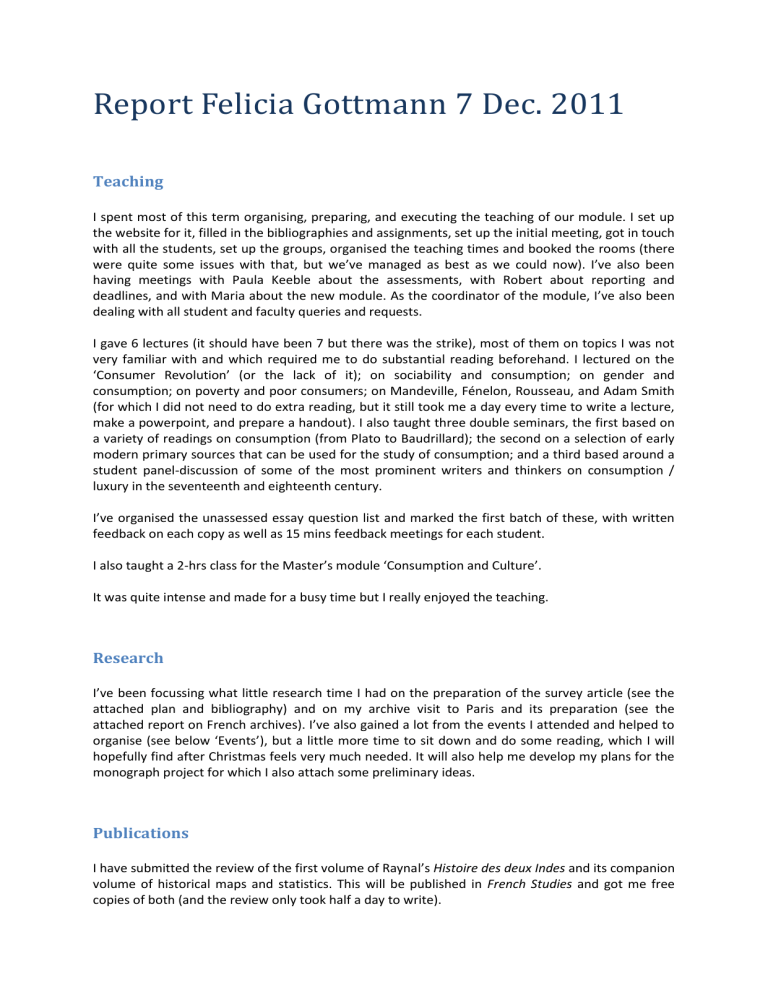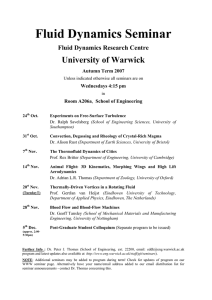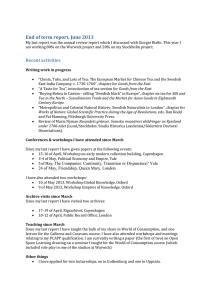Report Felicia Gottmann 7 Dec. 2011 Teaching

Report Felicia Gottmann 7 Dec. 2011
Teaching
I spent most of this term organising, preparing, and executing the teaching of our module. I set up the website for it, filled in the bibliographies and assignments, set up the initial meeting, got in touch with all the students, set up the groups, organised the teaching times and booked the rooms (there were quite some issues with that, but we’ve managed as best as we could now). I’ve also been having meetings with Paula Keeble about the assessments, with Robert about reporting and deadlines, and with Maria about the new module. As the coordinator of the module, I’ve also been dealing with all student and faculty queries and requests.
I gave 6 lectures (it should have been 7 but there was the strike), most of them on topics I was not very familiar with and which required me to do substantial reading beforehand. I lectured on the
‘Consumer Revolution’ (or the lack of it); on sociability and consumption; on gender and consumption; on poverty and poor consumers; on Mandeville, Fénelon, Rousseau, and Adam Smith
(for which I did not need to do extra reading, but it still took me a day every time to write a lecture, make a powerpoint, and prepare a handout). I also taught three double seminars, the first based on a variety of readings on consumption (from Plato to Baudrillard); the second on a selection of early modern primary sources that can be used for the study of consumption; and a third based around a student panel-discussion of some of the most prominent writers and thinkers on consumption / luxury in the seventeenth and eighteenth century.
I’ve organised the unassessed essay question list and marked the first batch of these, with written feedback on each copy as well as 15 mins feedback meetings for each student.
I also taught a 2-hrs class for the Master’s module ‘Consumption and Culture’.
It was quite intense and made for a busy time but I really enjoyed the teaching.
Research
I’ve been focussing what little research time I had on the preparation of the survey article (see the attached plan and bibliography) and on my archive visit to Paris and its preparation (see the attached report on French archives). I’ve also gained a lot from the events I attended and helped to organise (see below ‘Events’), but a little more time to sit down and do some reading, which I will hopefully find after Christmas feels very much needed. It will also help me develop my plans for the monograph project for which I also attach some preliminary ideas.
Publications
I have submitted the review of the first volume of Raynal’s Histoire des deux Indes and its companion volume of historical maps and statistics. This will be published in French Studies and got me free copies of both (and the review only took half a day to write).
I have also taken a few days off this summer to finish of my article on Voltaire, du Châtelet, and
Mandeville’s Fable, which will now be published in the European History of Ideas.
I have been preparing the survey article, an outline of which I attach.
Events and Presentations
All presentations I did this term were in for events held in Warwick: a short presentation on Quality for the URKEW workshop, another on Networks for the Comparing Companies workshop, and a final one on our project and my own research for the History Faculty Research Forum.
The main event this autumn was of course the Comparing Companies’ Workshop. It felt like a very good team effort and I am glad the format worked – I would have felt awful to have insisted on it had it proved to be a failure. I also think the rationale that Meike and me wrote and the website that
I set up for it helped to make it a success.
The URKEW workshop was another event that I thought went well and which I also very much enjoyed.
In terms of Warwick events, outstanding for me was the October seminar on Happiness Economics, but I also attended and very much enjoyed the workshop on Global History and early modernity, as well as the eighteenth century and global history seminars by Richard Whatmore, William Clarence
Smith, Susan Whyman, Fichter, and (to a lesser degree admittedly) Maarten Prak. I look forward to two more seminars this week in Warwick and the one in London.
Away from Warwick two events were particularly helpful to my thinking, the LSE conference in honour of Parthasarathi and the habilitation defence of Florence d’Souza in Paris. I will also attend a
IHR seminar on the French and the eighteenth-century world economy in London on Friday.
I am organising a joint GHCC-C18th seminar with Brian Cowan on the transnational history of coffeehouses next term.
Internet
I’ve set up and maintained the websites for both the Ashmolean and the Comparing Companies conferences, as well as the Intranet site for the Ashmolean conference. I’ve submitted my reports on the intranet and tried, over the summer, to keep the website up to date, especially the past and upcoming events sections, which I updated with programmes, etc. whenever available. I admit that I have let that slide once term and teaching started and Tim took over.
Other
Reading Groups
I’ve been liaising with the group to set up and organise the reading group on political economy, to which I very much look forward. I’m responsible for the first two out of the three sessions (Hanna is running the third) and am making sure that the readings are available to everybody well in advance.
Impact
I’ve attended the postdoc impact meeting (together with Chris) and am happy to try to keep track of all impact-related project work.

